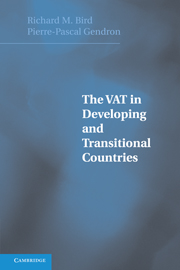Book contents
- Frontmatter
- Contents
- List of Tables
- Preface
- 1 Why This Book?
- 2 The Rise of VAT
- 3 Is VAT Always the Answer?
- 4 Trade and Revenue
- 5 Equity and the Informal Sector
- 6 What Should Be Taxed?
- 7 Key Issues in VAT Design
- 8 New Issues in VAT Design
- 9 Administering VAT
- 10 Dealing with Difficulties
- 11 The Political Economy of VAT
- 12 Where Do We Go from Here?
- Annex
- References
- Index
5 - Equity and the Informal Sector
Published online by Cambridge University Press: 16 November 2009
- Frontmatter
- Contents
- List of Tables
- Preface
- 1 Why This Book?
- 2 The Rise of VAT
- 3 Is VAT Always the Answer?
- 4 Trade and Revenue
- 5 Equity and the Informal Sector
- 6 What Should Be Taxed?
- 7 Key Issues in VAT Design
- 8 New Issues in VAT Design
- 9 Administering VAT
- 10 Dealing with Difficulties
- 11 The Political Economy of VAT
- 12 Where Do We Go from Here?
- Annex
- References
- Index
Summary
As anti-VAT protests and demonstrations around the world show, there has always been considerable popular concern about the equity aspects of VATs (Botes 2001). Equity is always and everywhere a central issue in taxation. Indeed, from one perspective the principal rationale for taxes in the first place may be thought of as an attempt to secure equity. Governments do not need taxes to secure money: they print the money. The role of the tax system is to take money away from the private sector in the most efficient, equitable, and administratively least costly fashion possible. One person's conception of what is equitable or fair may differ from those of others. In the end, views of what constitutes an equitable tax system are defined and implemented only through the political institutions within which countries reconcile (if they do) such conflicting views and interests. The result may diverge widely from what an outside analyst may consider to be fair or equitable in terms of some normative standard.
Equity issues may be approached at two different levels. One level focuses on the details of how taxes impose burdens on taxpayers who are in the same or different economic circumstances. At a more fundamental level, what matters are not such details but rather the overall effects of the fiscal system on the income and level of well-being of different people. The policy implications of these two approaches to tax equity may be quite different.
Information
- Type
- Chapter
- Information
- The VAT in Developing and Transitional Countries , pp. 70 - 80Publisher: Cambridge University PressPrint publication year: 2007
Accessibility standard: Unknown
Why this information is here
This section outlines the accessibility features of this content - including support for screen readers, full keyboard navigation and high-contrast display options. This may not be relevant for you.Accessibility Information
- 3
- Cited by
